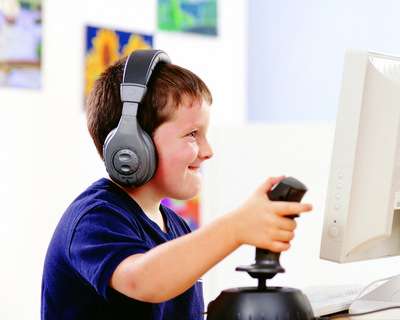April 8, 2014 report
Study shows computerized games can be used to improve children's grades in school

(Medical Xpress)—A study conducted by a team of researchers in Buenos Aires has led to claims that exposing young children to specialized computer games can lead to improved grades in school. In their paper, published in Proceedings of the National Academy of Sciences, the team describes the study and discusses their results.
Over the past several years, psychologists and neuroscientists alike have debated the outcome of research regarding the educational benefits of computer games on people of all ages. Some studies have shown improvement while others have not. Thus, new and ever larger studies have been designed and carried out to hopefully settle the matter once and for all. In this latest effort, the researchers enlisted the assistance of 111 first graders living and going to school in Argentina.
The goal was to find out if allowing children to play a computer game could demonstrate what is known in the profession as "far transfer" of executive functions to the real world—where mental exercise in one activity can boost mental abilities in another.
The children were a mix of low-income students, many of whom had attendance issues due to problems at home. Each was taken from regular school activities (three times a week) to a separate area where half of them played specially designed video games (those that have been created specifically to improve memory and planning) for 15 minutes, for a period of ten weeks. The other half played regular video games. During and afterwards, the children were monitored to see if the video game playing had any impact on their grades. Work and testing in the classroom remained unchanged and the teachers were not told the nature of the study until after it was over. In analyzing the data, the researchers found that those children who played the special video game and that prior to the study had lower grades due mainly to infrequent attendance, achieved higher test scores on their regular school work than they had up to that point—so much so that they actually caught up to the regularly attending children in math and language test scores.
The study doesn't prove that it was the video games that caused the improved grades, but it does suggest that specially designed video games can cause desired changes in executive functions. More studies will have to be done, some to replicate what the team in Argentina has done, before it can be proven that video game playing, truly can benefit students, and perhaps others.
More information: Far transfer to language and math of a short software-based gaming intervention, Andrea Paula Goldin, PNAS, DOI: 10.1073/pnas.1320217111
Abstract
Executive functions (EF) in children can be trained, but it remains unknown whether training-related benefits elicit far transfer to real-life situations. Here, we investigate whether a set of computerized games might yield near and far transfer on an experimental and an active control group of low-SES otherwise typically developing 6-y-olds in a 3-mo pretest–training–posttest design that was ecologically deployed (at school). The intervention elicits transfer to some (but not all) facets of executive function. These changes cascade to real-world measures of school performance. The intervention equalizes academic outcomes across children who regularly attend school and those who do not because of social and familiar circumstances.
© 2014 Medical Xpress
















